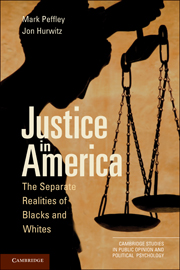Book contents
- Frontmatter
- Contents
- List of Tables
- List of Figures
- Acknowledgments
- 1 Introduction
- 2 Racial Bias in the Justice System
- 3 The Role of Fairness
- 4 The Consequences of Fairness
- 5 The Consequences of Fairness
- 6 Conclusions
- Appendix A National Survey and Survey Items
- Appendix B Examining Reciprocal Effects of Unfair Treatment and Neighborhood Discrimination
- References
- Index
- Titles in the series
2 - Racial Bias in the Justice System
Reality and Perception
Published online by Cambridge University Press: 05 June 2012
- Frontmatter
- Contents
- List of Tables
- List of Figures
- Acknowledgments
- 1 Introduction
- 2 Racial Bias in the Justice System
- 3 The Role of Fairness
- 4 The Consequences of Fairness
- 5 The Consequences of Fairness
- 6 Conclusions
- Appendix A National Survey and Survey Items
- Appendix B Examining Reciprocal Effects of Unfair Treatment and Neighborhood Discrimination
- References
- Index
- Titles in the series
Summary
In the last chapter, we defined the central role that fairness judgments will play in our analysis. To understand the huge race gap in public reactions to events (e.g., police brutality) and policies (e.g., racial profiling, or even ostensibly race-neutral policies such as the death penalty or three-strikes laws) in the justice system, it is essential to examine the races' diverging views of the fairness of the system. In subsequent chapters, we take a close look at the content, sources, and consequences of global views of the fairness of the justice system among Blacks and Whites. In this chapter, we confront several preliminary and altogether crucial questions in our analysis. Lurking behind any study of public perceptions of political objects is the question of whether these perceptions bear any resemblance to political and social reality. Accordingly, we begin this chapter with an assessment of whether the justice system in the United States is fair. More specifically, we ask: to what degree, and under what circumstances, is the justice system racially biased? As we will see in the discussion in the following text, this is not an easy question to answer. Determining whether racial disparities in arrests, sentencing, incarceration, and police misconduct are due to characteristics of offenders (who are disproportionately Black) or discrimination by agents of the system (e.g., police or prosecutors) is a difficult task.
- Type
- Chapter
- Information
- Justice in AmericaThe Separate Realities of Blacks and Whites, pp. 28 - 67Publisher: Cambridge University PressPrint publication year: 2010



